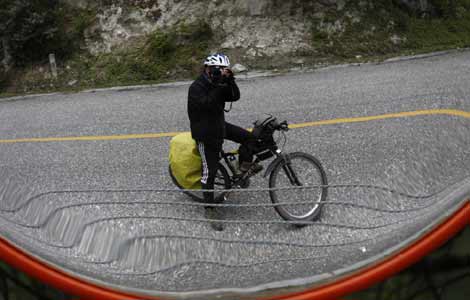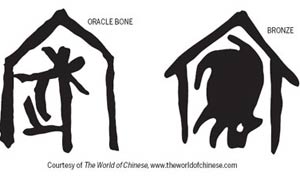Sheep business faces dilemma of eco conservation
Updated: 2011-10-06 13:42
(Xinhua)
|
|||||||||
CHICHENG, Hebei - A sheepskin dealer in north China's Hebei province is finding himself without work for the first time in more than 20 years.
"I started trading sheepskins when I was 18 years old. But in recent years, there are fewer sheep here," said the man, who travels among villages scattering deep in the mountains in Chicheng County to collect sheepskins and sell them to tanneries.
But now he finds himself in a difficult situation because after sheep and goats were not allowed to freely graze -- an effort to protect vegetation -- in Chicheng in 2002, villagers no longer raised as many sheep as they did before.
On the new motorcycle of the man, who declined to be named, were two sheepskins, the end result of an entire day of trekking on rugged mountain roads.
"I used to ride bicycle because I didn't need to travel far to collect enough sheepskins. But now even using motorcycle to go to more villages, the business is declining," he said.
In Chicheng, sheep farming had been a main source of income for many local residents for years. In the 1990s, a dealer could collect as many as 5,000 to 6,000 sheepskins every year.
However, the region has been targeted by government authorities who are seeking to stop desertification and conserve water resources. These authorities have put a stop to many sheep farming operations in order to preserve the environment and prevent desert sands from creeping south toward Beijing, located just 200 km south of Chicheng.
According to Liu Xin, vice-head of the husbandry bureau of Chicheng, there were 350,000 sheep in the county in 2000. But in 2008, the number dwindled to less than 100,000.
Liu said farmers were encouraged to raise sheep in captivity to sustain their generation-old business, but many failed because the mortality rates for captive sheep are very high.
The ban has significantly affected the incomes of local people, according to Liu. However, the sacrifice of the people of Chicheng has paid off in other ways.
"Look at the small hooves of the goats. They uproot the grass on the hills," said Zhang Guangliang, a resident of the village of Beicun.
In previous years, herds of goats and sheep that are famous for eating all the vegetation on barren mountains turned the mountains yellow and allowing desert sands to creep in.
"In the spring, wind brought sand to our yards," Zhang said. "At the end of a day, if you touched a windowframe, you would see your fingers covered with sand."
Mi Feng, vice head of the forestry bureau of Chicheng, said that the total area of desertified land in the county has shrunk from 85,333 hectares before the ban to just 20,000 hectares in 2009.
Zhang, once a sheep farmer himself, now relies on herb farming to make a living. After growing herbs for five years, he can sell the plants for 20,000 yuan ($3,092) this year.
He has also supplemented his income by using savings from his years as a sheep farmer to buy a forklift and hire a driver to work on construction sites. This additional stream of income provides him with an extra 100,000 yuan annually.
"I can still make money, even without sheep," he said.
Although other residents have also found new ways to keep bread on the table, Liu believes that it is still important to improve the ways in which the county's remaining sheep are raised.
"We can raise sheep in captivity, but local farmers have complained that the mortality rates for captive sheep are too high," he said.
"Perhaps we should teach the farmers how to change their methods," he added.










